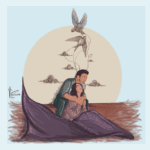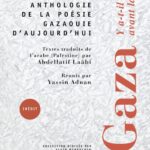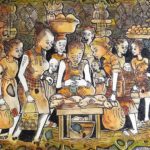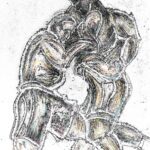Sorrow, Uuganbayar Kh, uugan.art/
Uuganbayar Kh was born in 1979 in Mongolia. He earned his degrees in art from College of Fine Arts, Ulaanbaatar, in 1996, and Mongolian State University of Culture and Arts in 1998. He aims to illustrate the connections between humans, nature, and the extraordinary essence of the animal kingdom. His art has been featured in many exhibitions, such as Red Ger & UB Art Gallery in Mongolia (2017) and Heng Artland in Singapore (2010). Kh is a graduate of Minerva Art Academy, University of Applied Sciences, Hanze University Groningen, Netherlands.
Translators’ Note: In writing about the murders of her forefathers, Mugi Oyoo Munkhnaran assumes readers are aware of Mongolia’s history. However, this genocide is little known in the west. Thousands of Buddhist monks, teachers, and scores of citizens—including Mugi’s great-grandfather, who was an aide to a high-ranking lama—were killed in 1930 during brutal purges while the country was a Soviet satellite. In addition, Ms. Munkhnaran’s grandfather was killed two decades later under similar circumstances in 1956 for refusing to concede to the Communist party’s demands to confiscate his property. His death left the family without their herding animals and in poverty. These traumatic losses infuse the poem, counterbalanced by the poet’s memories.
One of the largest countries in Asia and land-locked with China and Russia on its borders, Mongolia is most known for its nomadic culture and wide unfenced landscapes of steppe and desert, along with traditions like eagle hunting and horseback riding. Founded in the 13th century by Genghis Khan, a brutal leader who defeated clan after clan as he created his empire, Mongolia was once extended from Korea to Hungary and from India to Russia. Kublai Khan ruled after his descendent, taking control of northern China, though eventually this vast empire fractured as Kublai Khan focused on his aims in China during the Yuan dynasty. By the early 20th century, Mongolia was led by a Buddhist leader with some independence until the Russian Revolution. In 1924, the country’s first political party, the Mongolian People’s Party, governed independently until Stalin came to power in Russia. Soon, religion was suppressed, Buddhist monasteries were destroyed, and seventeen thousand monks—3% of the population—were executed.
My Grandfather’s Fate
My great-grandfather carried his faith
his vows and the teachings of his elders.
He did not turn with the changing of tides.
He did not grovel or plea
on that cold night long ago
when at the top of distant hills, he was shot.
I listen as my grandmother remembers
this old story of my country.
I have heard it before.
As she speaks, snow on the Gobi are thawing.
She holds a single sheet
the decree acquitting my great-grandfather.
Her hands tremble like spring flowers,
tears like icicles melt from her eyes.
This story of fate meeting faith
and a man who couldn’t save himself.
He and his lama
arrested, accused falsely
shot to death. So many others.
Like camel bones on the steppe,
thousands upon
thousands lost.
Their pain
still haunts.
My grandmother can’t read
but her fingers touch each letter
on the simple piece of paper.
Once her father was an enemy
then acquitted though
the government’s legal words
too late for his family.
This story travels
through decades
as later my grandfather,
son of the man murdered
for his faith, refused
to yield and is killed
because even in the desert
there’s corruption.
At night the ger fills
with my grandmother’s
prayers. The altar
lamps burn.
Ancestors are flickering
in the shadows.
I imagine
the grandfathers
filling cups with ayrag
as someone plays the fiddle
to ward off the cold.
Moon is melancholy
in the night sky
and my tears like sleet
rebuke the latticed felt.
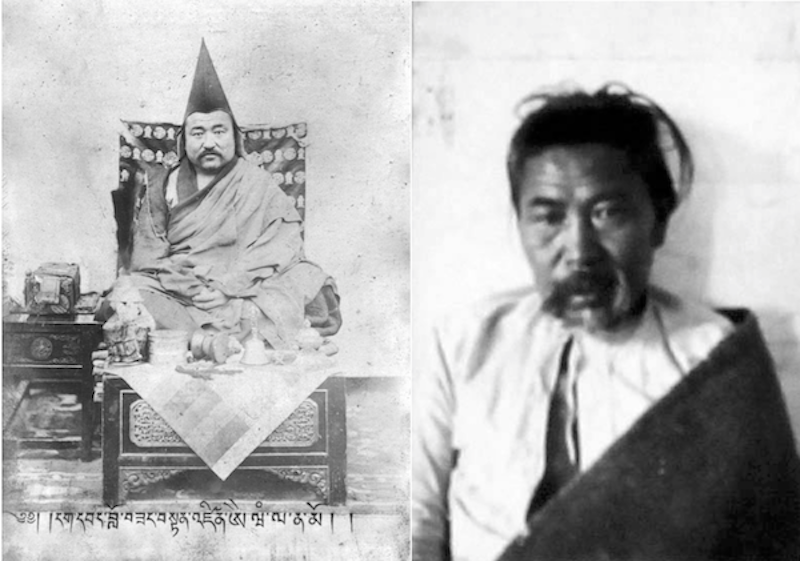
The high-ranking lama, Eguzer Qotagt Mugi (left), was killed in 1930 in Mongolia. He was among the estimated 17,000 Buddhist monks murdered, followed by Stalin’s campaign to solidify his power over the Communist Party of the Soviet Union. The country experienced the worst of this brutal cleansing between 1937 and 1939. The number of monks in the country dropped from about 100,000 in 1924 to 110 in 1990. More than 1,200 monasteries and temples were also demolished. The poet’s great-grandfather, Chadarbal (right), was an aide to lama Eguzer Qotagt when he was shot and killed alongside other monks and people around them.
Mugi Oyoo Munkhnaran (author) / Billy Naranbaatar and Pamela Hart (translators)
Mugi Oyoo Munkhnaran is the editor of Toono Editions, which works with the Mongolian Academy of Culture and Poetry to introduce audiences to the literature of her country. She works at the Mongolia Academy of Culture and Poetry. She published an anthology of love poems, “Argagui Amrag,” in 2008 and her poetry collection, “Birds Flying From Beneath My Pillow,” in 2022.
Billy is the grandson of Mongolia's poet laureate Mend-Ooyo. He works in the USA as a biologist.
Pamela is the writer in residence at the Katonah Museum of Art in Katonah, NY, where she teaches and manages arts-in-education programs in schools and correctional facilities. Her book, Mothers Over Nangarhar, winner of the Kathryn A. Morton prize, was published in 2019 by Sarabande Books. She received a fellowship from the National Endowment for the Arts in poetry. In addition, she has served as poetry editor for Afghan Voices, the Afghan Women’s Writing Project, and As You Were: The Military Review.

